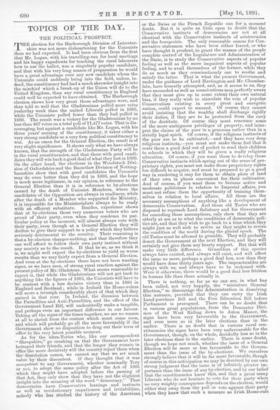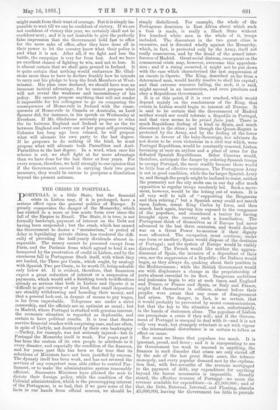TOPICS OF THE DAY.
•
THE POLITICAL PROSPECT. THE election for the Harborough Division of Leicester- shire was not more disheartening for the Unionists than we had expected. It had been obvious from the first that Mr. Logan, with his travelling-van for local meetings and his happy expedients for teaching the rural labourers how to use the ballot, was a singularly popular candidate, and that with his very long season of preparation he would have a great advantage over any new candidate whom the Unionists could suddenly bring into the field, unless, in- deed, the constituency had had a much shrewder insight into the mischief which a break-up of the Union will do to the United Kingdom, than any rural constituency in England could well be expected to have obtained. The Harborough election shows how very great those advantages were, and they told so well that the Gladstonians polled more votes yesterday week than the united Liberals polled in 1885, while the Unionists polled fewer than they bad polled in 1886. The result was a victory for the Gladstonians by no less than 487 votes on a total poll of 11,477 votes. That is dis- couraging, but against a candidate like Mr. Logan, with his three years' nursing of the constituency, it takes either a very strong candidate or a very firm political constituency to win. As an omen for the General Election, the result is of very slight significance. It shows only what we have always known, that the strength of the Gladstonian Party will be in the rural constituencies, and that there with good candi- dates they will win back a good deal of what they lost in 1886. On the other hand, the elections in the Woodstock Divi- sion of Oxfordshire and the Bassetlaw Division of Notting- hamshire show that with good candidates the Unionists may do even better than they did in 1886, and the hope is much more legitimate, in our opinion, in reference to the General Election than it is in reference to by-elections caused by the death of Unionist Members, where the candidates of the Opposition are always in readiness, while after the death of a Member who supported the Ministry, it is impossible for the Ministerialists always to be ready with an efficient substitute. Besides, experience shows that at by-elections those very numerous voters who are proud of their party, even when they condemn its par- ticular policy at the moment, will almost always vote with their party, even though at a General Election they will decline to give their support to a policy which they believe seriously detrimental to the country. Their reasoning is that a by-election changes nothing, and that therefore they can well afford to follow their own party instinct without any anxiety as to the result. If that be so, as we think it is, we might well expect the by-elections to yield us worse results than we may fairly expect from a General Election. And even at the by-elections there have• not been wanting signs, as we have seen, of strong rural reaction against the present policy of Mr. Gladstone. What seems reasonable to expect is, that while the Gladstonians will not get back to anything like the figures of 1885, the Unionists will have to be content with a less decisive victory than in 1886 in England and Scotland ; while in Ireland the Home-rulers will score a triumph considerably short of that which they gained in that year. In Ireland, the disunion between the Parnellites and Anti-Parnellites, and the effect of the Government Land Bill, will undoubtedly make a tangible, and perhaps even an important difference in our favour. Taking all the signs of the times together, we see no reason at all to shrink from the contest which must come soon, and which will probably go all the more favourably if the Government show no disposition to drag out their term of office to the very latest possible moment. As for the ultra-Tories who, like our correspondent " Shropshire," go croaking on that the Government have betrayed their friends, and that the longer they remain in office the more decisively will the country reject them when the dissolution comes, we cannot say that we set much value by their discontent. If they thought that it was competent to any Government, whether nominally Tory or not, to adopt the same policy after the Act of 1885 which they might have adopted before the passing of that Act, they only show that they have not the slightest insight into the meaning of the word " democracy." That democracies have Conservative leanings and instincts as well as revolutionary impatiences and irritabilities, nobody who has studied the history of the American or the Swiss or the French Republic can for a moment doubt. But it is quite as little open to doubt that the Conservative instincts of democracies are not at all identical with the Conservative instincts of aristocracies and the bourgeoisie. The only reasonable course for Con- servative statesmen who have been either forced, or who have thought it prudent, to grant the masses of the people complete control of the Legislature and Administration of the State, is to study the Conservative aspects of popular feeling as well as the more impatient aspects of popular feeling, and to avail themselves of the former, while they do as much as they conscientiously can to soothe and satisfy the latter. That is what the present Government, under the guidance of Lord Hartington and Mr. Chamber- lain, have honestly attempted, and, as it seems to us, they have succeeded as well as conscientious men perfectly aware that they must give up to some extent their own natural bias, if they really wish to stimulate the vein of popular Conservatism existing in every great and energetic nation, could expect to succeed. Of course they cannot avoid insisting that the wealthy shall discharge rigidly their duties, if they are to be protected from the envy of the destitute. Of course they must renounce some of the more ambiguous privileges of property, and inter- pret the claims of the poor in a generous rather than in a strictly legal spirit. Of course, if the religious instincts of the poor are to be cultivated,—and they have very deep religious instincts,—•you must not make them feel that it costs them a good deal out of pocket to send their children to schools in which they will be given a really religious education. Of course, if you want them to develop those Conservative instincts which spring out of the sense of pro- prietary rights, you must not make those proprietary rights too difficult to acquire, and must be prepared to go a good way in rendering it easy for them to obtain plots of land of their own in places convenient for their cultivation. And of course, if you want them to become active and moderate politicians in relation to Imperial affairs, you must not refuse them the opportunity of training them- selves in relation to local affairs. All these are the necessary assumptions of anything like a development of democratic Conservatism. And those old Tories who are disposed to reproach Lord Salisbury and his Government for conceding these assumptions, only show that they are utterly at sea as to what the conditions of democratic poli- tics are, and that they wish to go back to a time which they might just as well seek to revive as they might to revive the condition of the world during the glacial epoch. The old Tories must be allowed to grumble. They will probably desert the Government at the next Election, and they will certainly not give them any hearty support. But that will make very little difference. Grumblers of this species always have existed, and always will exist, and will affect the issue no more, perhaps a good deal less, now than they would have done thirty years ago. The impracticables are always with us, and always have to be reckoned with. Were it otherwise, there would be a good deal less friction in human life than there actually is.
There is nothing, so far as we can see, in what has been called, not very happily, the " miniature General Election," to discourage the Administration in dissolving this autumn, provided that they can carry the Irish Land-purchase Bill and the Free Education Bill before Parliament is prorogued. There can be no doubt that in various great populations, from the Doncaster Divi- sion of the West Riding down to Aston Manor, the signs have been very favourable to the Government, and even more so in the later elections than in the earlier. There is no doubt that in various rural con- stituencies the signs have been very unfavourable for the Government, though, on the whole, decidedly less so in the later elections than in the earlier. There is some doubt, though we hope not much, whether the issue of a General Election will be more or less favourable to the Govern- ment than the issue of the by-elections. We ourselves strongly believe that it will be far more favourable, though of course in this anticipation we may be deceived by our own strong judgment that the issue is of infinitely greater im- portance than the issue of any by-election, and by our belief that the constituencies know this, and that a great many Liberals who do not hesitate to vote for their party when no very weighty consequence depends on the election, would either stay away from the poll or vote against their party when they knew that such a measure as Irish Home-rule might result from their want of courage. But it is simply im- possible to wait till we can be confident of victory. If we are not confident of victory this year, we certainly shall not be confident next ; and it is not desirable to give the perfectly false impression that the Government hold fast to office for the mere sake of office, after they have done all in their power to let the country know what their policy is and what it is not. After all, if we fight and lose the battle, the campaign is very far from lost. And we have an excellent chance of fighting to win, and not to lose. It is almost certain that we shall gain ground in Ireland. It is quite certain that nothing would embarrass Mr. Glad- stone more than to have to declare frankly how he intends to carry out his pledge to keep the Irish Members at West- minster. His plan once declared, we should have won an immense tactical advantage, for he cannot propose what will not reveal the weakness and inconsistency of his policy. He cannot propose anything that will not render it impossible for his colleagues to go on comparing the consequences of Home-rule in Ireland with the conse- quences of Home-rule in Canada or Australia, as Lord Spencer did, for instance, in his speech on Wednesday at Evesham. If Mr. Gladstone seriously proposes to relax the tie between England and Ireland as far as the tie between England and every one of her great self-governing Colonies has long ago been relaxed, he will propose what will alienate his own party to the last degree. If he proposes to do nothing of the kind, he must propose what will alienate both Parnellites and Anti- Parnellites to the last degree. In a word, when once his scheme is out, we shall fight at far more advantage than we have done for the last three or four years. For every reason, therefore, we hold strongly to our opinion that if the Government succeed in carrying their two great measures, they would be unwise to postpone a dissolution beyond the present autumn.



































 Previous page
Previous page